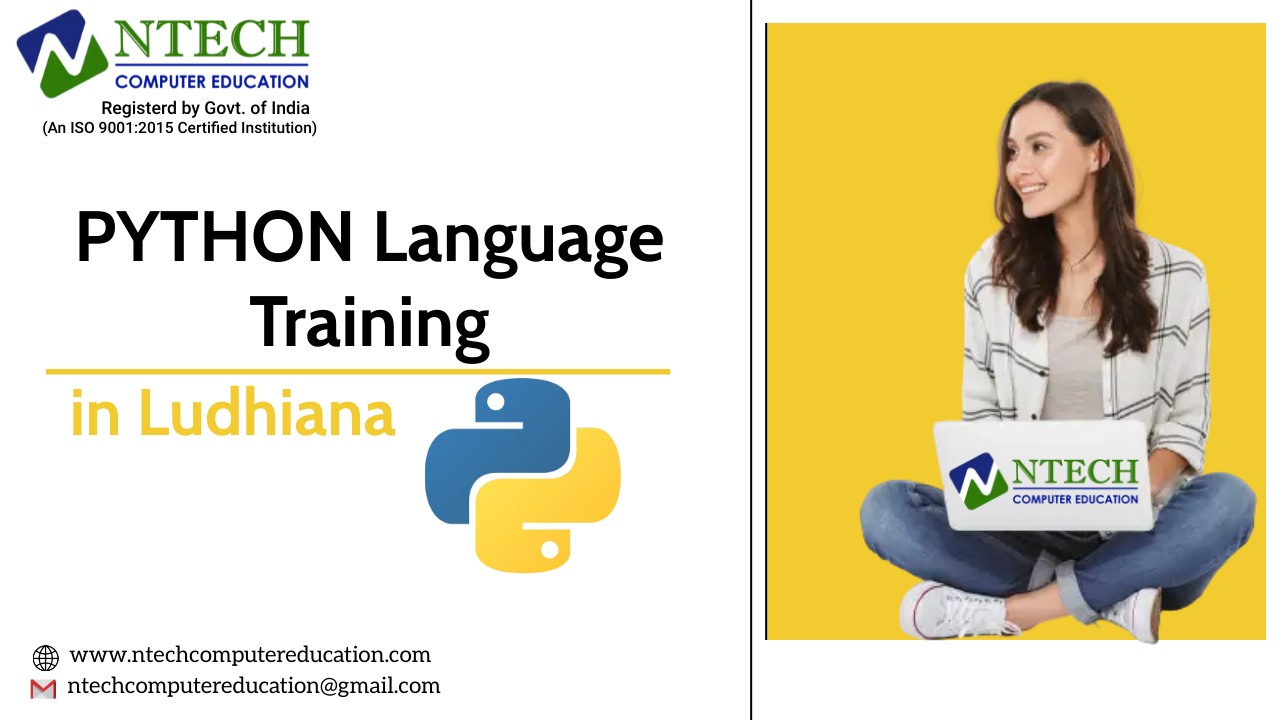Python Training
Python training can assist you build a desirable career. We’ve put efforts to produce the Python training in Ludhiana which is the reason why we have been ready to earn a decent name for ourselves within the market. We are an experienced Python training training in Ludhiana with a great deal of desire to ascertain our students doing great within the IT field. We have a number of the most experienced and knowledgeable trainers in Ludhiana, having great proficiency in theories and immense technical knowledge. And guess what, they train students by applying a student-centric approach to teaching. As a result, they need always been successful in ensuring satisfactory learning outcomes in trainees. Python is a programming language that interpreted, interactive, object- oriented and extended. Its philosophy of design emphasizes the readability of the code, and It’s programming structure allows programmers to precise concepts in fewer lines of code than in languages like C ++ or Java. Python supports many programming models, including object-oriented programming, deterministic programming, and functional or procedural methods. It contains dynamic system and automatic memory management and features a large standard library.
 This Course includes the following Topic:-
This Course includes the following Topic:-
 Introduction to PYTHON
Introduction to PYTHON
-
1.1 What is Python
1.2 Features of Python
1.3 Installing Python & IDEs (PyCharm, VS Code,CMD)
1.4 Running Python Programs
1.5 Python Syntax & Indentation
 PYTHON Basics
PYTHON Basics
-
2.1 Variables & Data Types
2.2 Type Casting
2.3 Input & Output (input(), print())
2.4 Comments in Python
2.5 Operators (Arithmetic, Comparison, Logical, Assignment.. etc)x
 Control Flow
Control Flow
-
3.1 if, elif, else Statements
3.2 Nested if Statements
3.3 Loops (for, while)
3.4 break, continue, pass
3.5 Loop else
 Data Structures
Data Structures
-
4.1 Strings
4.2 Lists
4.3 Tuples
4.4 Sets
4.5 Dictionaries
 Functions (Methods)
Functions (Methods)
-
5.1 Defining & Calling Functions
5.2 Parameters & Arguments
5.3 Return Values
5.4 Default, Keyword & Variable-length Arguments
5.5 Lambda Function
 Modules, Packages & Libraries
Modules, Packages & Libraries
- 6.1 Importing Modules (import, from … import)
6.2 Built-in Modules (math, random, datetime)
6.3 Creating Custom Modules
6.4 Python Package Index (PyPI)
6.5 Virtual Environments (venv)
6.6 NumPy, Pandas… etc
 File Handling
File Handling
-
7.1 Reading Files
7.2 Writing & Appending Files
7.3 Working with with open()
7.4 File Paths with os
 Exception Handling
Exception Handling
-
8.1 try, except
8.2 else, finally
8.3 Raising Exceptions
8.4 Custom Exceptions
 Object-Oriented Programming (OOP)
Object-Oriented Programming (OOP)
- 9.1 Classes & Objects
9.2 Constructors (__init__)
9.3 Instance & Class Variables
9.4 Methods (Instance, Class, Static)
9.5 Inheritance
9.6 Polymorphism
9.7 Encapsulation & Abstraction
 DSA with PYTHON
DSA with PYTHON
- 10.1 Arrays & Strings
10.2 Recursion & Backtracking
10.3 Linked Lists
10.4 Stacks & Queues
10.5 Trees & Graphs
 Advanced with PYTHON
Advanced with PYTHON
- 11.1 List Comprehensions
11.2 Dictionary & Set Comprehensions
11.3 Iterators & Generators
11.4 Decorators
11.5 Context Managers
 Working with Databases
Working with Databases
- 12.1 MySQL in Python
12.2 MongoDB in Python
 GUI Programming with Tkinter
GUI Programming with Tkinter
- 13.1 Introduction to Tkinter
13.2 Creating Windows & Widgets
13.3 Layout Management (pack, grid … etc )
13.4 Handling Events & Commands
13.5 Menus, Frames & Dialog Boxes
13.6 Building GUI Application
 Advanced Algorithms
Advanced Algorithms
Divide and Conquer
- Merge Sort.
- Quick Sort.
Dynamic Programming
- Greedy Algorithms
- Backtracking
 Live Project
Live Project
 e-Test
e-Test
🌟 Why Choose Us?
✅ Expert-Led Courses
All our courses are designed and delivered by industry professionals with real-world experience. You’ll learn practical skills that are in demand today.
✅ Beginner-Friendly to Advanced
Whether you’re just starting out or looking to sharpen advanced skills, our curriculum is tailored to suit every level — with step-by-step guidance.
✅ Hands-On Projects
We believe in learning by doing. Every course includes real-life projects, coding challenges, and portfolio-worthy work to showcase your skills.
✅ Affordable Learning
Get top-quality education at a fraction of the cost. We offer flexible pricing, scholarships, and free resources to make learning accessible to everyone.
✅ Career-Focused Paths
Our courses aren’t just about theory — we prepare you for the job market, with resume help, interview prep, and job-ready project work.
✅ Community Support & Mentorship
Join a thriving community of learners and get access to mentors, peer discussions, and support when you’re stuck.
✅ Certification & Recognition
Earn certificates of completion and badges that you can add to your resume, LinkedIn profile, or personal portfolio.
🚀 Who Can Join?
- 👩🎓 Students – Looking to add job-ready skills to their resume
- 👨💼 Working Professionals – Upskill or switch to tech careers
- 💻 Freelancers – Learn in-demand skills to land more gigs
- 🧑🏫 Teachers & Educators – Refresh and modernize your teaching skill set
- 🤖 Tech Enthusiasts – Anyone curious about coding, data, or tech in general!
Taught by Industry Professional Experts having 10+ Years of Experience …
